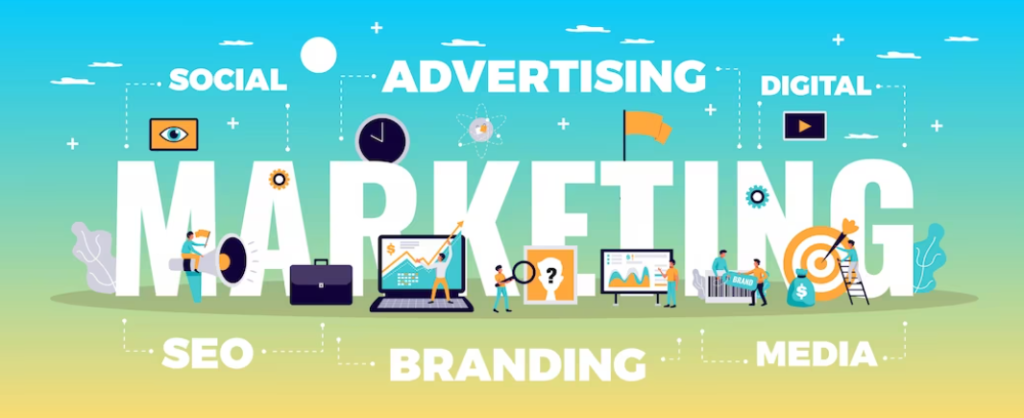Growth is what the Startup Marketing Playbook needs most. Traffic, leads, customers, and income increase. If your startup wants to expand, it needs a good marketing plan.
Marketing a startup differs from selling an established firm in various ways. First, startups must be clever and efficient in marketing because they lack resources or funding.
Startups start from nothing with brand recognition, making it harder to build awareness and trust.
Startup Marketing Playbook typically struggles to define and articulate its unique value offer to potential consumers and investors.
We have created a step-by-step guide to assist startup entrepreneurs in developing and implementing a successful marketing plan that addresses their particular difficulties.

Outline your strategy
Before considering company goals, choose a method that works for you. All successful startup marketing strategies must consider these:
- What are your short- and long-term brand recognition and customer acquisition goals?
- Who’s your audience?
- Who will buy your product/service, and how will you attract them?
- What sets you apart from your competitors?
- Has market research helped you narrow your specialty and determine what will sell?
- Your budget?
Plan your goals
To succeed with your startup, establish and prioritize your goals.
Startups aim to increase brand recognition and client acquisition. Both are vital, but choose the one that best suits your business.
Prioritizing brand awareness: Develop a marketing plan that communicates your unique value proposition and separates you from your competition to boost brand awareness. Social media marketing, influencer collaborations, and content marketing may increase exposure and reputation.
Focus your marketing approach on identifying and converting leads into paying consumers to gain new clients. Email marketing, lead magnets, and conversion-optimized landing pages boost engagement and conversions. Employ good design, text, and calls to action to get your viewers to act.
These aims are not mutually exclusive and are merely examples. Depending on the stage of your startup, you may prioritize one aim or strive to achieve both.
The most crucial step is defining startup success and creating a marketing plan that supports it.
Your target audience
A Startup Marketing Playbook entrepreneur must ensure their marketing efforts reach the appropriate individuals with the correct message.
Who is your ideal audience, or who do you want? Ask yourself these crucial questions to find your startup’s ideal audience:
- What problem do you solve for customers?
- How does your product differ from competitors?
- Why should customers select your company?
- Which B2B sectors or business sizes benefit most from your product or service?
- Does your product or service appeal to certain demographics, geographies, or hobbies in B2C?
Answering these questions can help you find your target audience and create a marketing approach they’ll like.
Remember, identifying your target audience allows you to craft a message that addresses their pain areas and provides a solution that meets their wants, which is the key to creating a loyal client base and expanding your startup.
Identify your market position.
Lack of demand is a leading cause of startup failure.
This might result from not solving a client need, not being unique enough to stand out from rivals, having a restricted focus with a tiny pool of possible consumers, or not positioning your product or service to reach a suitable audience.
To boost your startup’s chances of success, undertake rigorous market research to evaluate product demand and client interest.
After determining enough demand to support your firm, you may work on communicating the value of your product or service to your target audience.
You can utilize these market research methods:
Survey and interview potential consumers about their issues, requirements, preferences, and present solutions. This can help you understand market demand for your product or service.
Competitor research: Know what other products and services are on the market and how they present themselves. Find market gaps your product can fill.
Look at industry trends: Monitoring industry trends and developments. Find business opportunities and dangers.
Conduct keyword research: Use SEO tools like SEMrush or Ahrefs to watch search queries, assess potential clients’ online behavior, and determine search demand for your product or service.
Before launching, test your product or service with a small sample of possible clients. Then, you may assess how effectively it solves their concerns and make any necessary modifications before launching.
If market research and testing validate your idea, create a minimum viable product (MVP) and test it with paying customers to determine how much people are willing to pay for your product and how much revenue you can expect.
Startup Marketing Playbook Set a budget
New firms typically overlook this. For instance, a startup may choose social media over a national marketing campaign since they cannot afford it.
It might be, but you’ll need cash to improve awareness and hire someone to produce eye-catching ads and schedules.
You must carefully deploy marketing funds regardless of their amount. Set clear goals and allocate marketing expenditures to platforms to help you achieve them.
When a channel fails, be flexible and explore different techniques.
As your business and finances grow, you may progressively boost your marketing spending and target new consumers.

Focus on the right marketing channels.
Many new business owners are confused about how to allocate their limited marketing budgets and time among the seemingly endless variety of outlets accessible nowadays. How about email marketing instead of Facebook ads? Would online content marketing outperform radio commercials?
Since each firm has its target demographic, the solutions to these questions may vary. Consider LinkedIn as an alternative to Instagram as a marketing channel; it could be more effective if you mainly aim for a business-to-business audience.
A few of the most popular avenues for small and medium-sized businesses advertising are detailed below:
Launching your very own domain
Your startup can’t get off the ground without a website. Whether you’re offering a service or a product, a website is a multipurpose marketing tool that may connect you with your ideal customers.
If you’re starting with website development, several free and user-friendly Content Management Systems (CMS), like WordPress, can get the job done. To build a professional website that reflects your business well and attracts visitors, you might want to hire a web designer, developer, or agency specializing in this area.
It is essential to find and buy a domain name representing your company and acting as your online identity before launching your website. To maintain cohesion throughout your social media accounts, whether current or future, you should verify that the domain name you’ve picked is available on each one.
Be careful to incorporate the following aspects within your website content:
A web page that introduces your company and its offerings to potential clients. Additionally, this website should have a sign-up form that enables you to communicate with consumers regarding upcoming events, discounts, and new items.
An “About Us” section detailing your background as the company’s proprietor. Remember that people purchase from others, so tailor this page to your target audience’s interests.
Online catalog of your goods and services that clients may peruse and buy
A part of your blog where you may steadily spew wisdom to your followers and show them how knowledgeable you are in your profession
Optimization for Search Engines
Your ideal customers are probably looking for what you provide online since there are an estimated 8.5 billion searches on Google daily.
Search engine optimization, or SEO, enhances your website’s visibility in response to user queries for specific products or services on platforms like Google. Customers may be seeking detailed information on your product, like “organic shampoo,” or they may be seeking recommendations, like “which is the best organic shampoo for dry hair,” to learn more about your offerings.
Improving your ability to contact your intended demographic is a key advantage of search engine optimization. To ensure that individuals likely interested in your startup’s offerings find your website, you should study your target audience’s search habits and use those terms.
Search engine optimization also has the bonus of establishing your company as an authority in your field. One way to show your audience that you’re an expert in your field and earn their confidence is to provide helpful, useful material that answers their queries. More conversions and, eventually, purchases may result from this.
For new business owners concerned with search engine optimization, here are a few practical suggestions:
If you want to know what your ideal customers are looking for, you need to conduct keyword research. Incorporate these keywords into your website’s content, meta tags, and page names to enhance search engine optimization.
Make engaging, educational material that solves problems and answers questions for your intended audience. Your website’s search engine rankings will improve, and your brand’s credibility will grow.
Your website must be responsive and compatible with mobile devices. According to Google, user engagement criteria, including mobile friendliness and page download speed, are ranking considerations. So, make sure your website is easy to navigate and quick to load.
Use analytics tools to keep tabs on how well your website is doing and where it stands in search engine results. Get the most out of your website by using this data to pinpoint its weak spots.

Startup Marketing Playbook Social Media Marketing
You can bet that the people you’re trying to reach will be active on social media and search engines. No matter what industry your startup is targeting, you can be sure that some of your potential customers are engaged on social media. Consider this: Facebook has about 3 billion active monthly users, Instagram has 1.4 billion, and TikTok has 1 billion.
You can’t just blatantly “promote” on social media; unlike search engine optimization (SEO), where prospective clients actively seek what you provide, social media audiences are there for other reasons. Your marketing strategies should reflect this by aiming to engage, entertain, and inspire.
You can choose to advertise on social media sites in addition to engaging in “organic” social media marketing strategies like increasing your audience size through consistent publishing of compelling content and engagement with existing users.
A significant budget isn’t required, but short-term ad planning should be part of any social media strategy that wants to succeed, particularly when attracting early adopters and creating leads.

You provided several choices for social media advertisements, such as:
Meta Ads (Instagram and Facebook)—With a big user base all around the globe, this presents a huge potential for young businesses just starting. This bodes well for your business, indicating that many interested parties are eager to hear more about you. You may narrow your focus to a certain age bracket, geographic region, or group of people.
Ads on Twitter—Because Twitter is always evolving, users tend to overlook it. Nonetheless, you may still use several advertising choices to get the word out about your company, increase traffic to your website, and get new fans. Keyword usage, interest, geography, and demographics are all potential targets.
LinkedIn advertisements—While not everyone will find value in them, LinkedIn can provide a platform to market oneself to those with similar interests. For example, a startup looking at a certain post may set up advertisements targeting that role specifically.
Read our tutorials to find out how to use social media for your new business:
- The Keys to a Successful Social Media Bio
- Avoid These 6 Hashtagging Pitfalls
- The Five Practices Of Proficient Social Media Managers
Startup Marketing Playbook Online advertising
If you’re a Startup Marketing Playbook looking to increase brand recognition, website traffic, and potential customers, there are many online advertising options beyond social network advertisements.
As a “shortcut” to search traffic while you wait for your SEO efforts to take effect, which may take months, Google Ads can be a terrific method to attract potential clients searching for your products or services.
When you set up Google Ads, you essentially “bid” on keywords, which means you tell Google the amount you’re ready to pay per click that results from a search for a specific term. For this reason, “Pay-Per-Click” (abbreviated as “PPC”) is the name given to this type of advertising. When deciding which advertisements to display in search results, Google considers your bid in addition to the ad’s quality and the website it links to.
Paid search advertisements may grow pricey if you target the wrong demographic or use the wrong keywords. The most costly keywords in the UK may cost as much as £80 per click, so it’s wise to enlist the aid of an expert when establishing your campaigns.
Display advertisements, which consist of pictures and banners placed on other websites your target audience may be visiting (such as news websites, industry blogs, forums, etc.), are another way to market your startup using the Google advertisements network. Initially, they may be a fantastic method of getting the word out about your startup.
Email marketing Startup Marketing Playbook
For new businesses, email marketing may be a very useful kind of focused marketing because of its low cost and high efficiency. Your marketing efforts will reach a far more specific demographic if you compile the email addresses of people who have already shown an interest in your company. This can improve your chances of converting visitors into buyers by directing them to people more likely to be interested in your offer.
Email marketing also lets you connect with your consumers more personally. Newsletters and promotional emails sent regularly help keep your company in customers’ minds and position you as an authority in your field. For new businesses trying to build a long-term clientele, email marketing is an essential tool for boosting consumer loyalty and repeat purchases.
In conclusion, email marketing has the potential to be an effective tool for new businesses seeking to expand their consumer base, raise product recognition, and attract potential investors.
Data protection standards, such as the General Data Protection Regulation (GDPR), are crucial for business owners to comply. One important part is getting people’s permission before contacting them for marketing reasons.
Using a permission form on your website or collecting contact information from clients at your brick-and-mortar establishment are two good examples.
You may send targeted newsletters using email marketing platforms like MailChimp once you have collected email addresses from those who have agreed to receive them. Because of this, brand loyalty may grow, and customers will be more likely to stick with you instead of going elsewhere.
Startup Marketing Playbook Content marketing
information marketing is a method that aims to produce and disseminate high-quality, relevant information consistently. The objective is to draw in and keep your intended demographic’s attention, interest, clicks, leads, and revenue.
This term refers to producing and disseminating informative content like articles, films, infographics, and social media postings.
Content marketing may be quite helpful for new companies. It may boost your company’s credibility, introduce more people to your brand, and encourage them to visit your website. In addition to that, it may increase your search engine ranks and create leads.
Here are a few practical pointers for new businesses looking to launch a content marketing campaign:
Identify who you’re writing for: Learn your audience’s demographics, interests, and problems so you can provide them with the information they need.
Please set up a content schedule: Make a schedule for when you will publish different sorts of content and who will be responsible for generating it.
Create material of high quality: Stay focused on meeting your target audience’s requirements by creating high-quality, educational, and entertaining content.
Advertise your material: Get your content in front of more people by promoting it through various channels, such as social media and email marketing.
Evaluate and enhance: If you want to know how effective your content marketing strategy is, use analytics to track the results.
Stick to your word: Keep your audience interested by publishing information consistently and regularly.
Draw on images: Make your material more interesting and shareable using photographs, videos, infographics, and other visuals.
If your Startup Marketing Playbook follows these guidelines, content marketing may help bring in consumers, build your brand’s credibility, and get people to try your product before the general public.
Referral schemes
Startup Marketing Playbook can benefit from referral networks as a marketing strategy since they tap into the power of word-of-mouth referrals. Incentives for clients to recommend your business to their friends and family are one method to establish a referral network. Incentives for returning customers are another way to keep them coming back.
You can also use social media to your advantage by forming partnerships with influencers and promoters to market your goods and services to their audiences. This can help you reach more people in your target market at a lower cost than more conventional forms of advertising.
Another strategy to consider is incentivizing consumers who promote your business on social media sites like Instagram. Not only may this encourage client advocacy, but it can also provide marketing-ready user-generated content. With less time and money needed to create original content and an incentive for customers, this is a win-win for the company and the customer.
Startup Marketing Playbook Offline marketing
Lastly, don’t forget to incorporate offline advertising tactics into your marketing strategy. With everything happening online, it’s easy to overlook the importance of in-person contacts, but word of mouth is still a powerful tool.
With the chance for face-to-face contacts and word-of-mouth referrals, offline marketing initiatives may supplement startups’ digital efforts. As a whole, your marketing strategy should incorporate offline advertising techniques.
For new companies, attending networking events is a great way to meet other companies in their field and get their name out there. One way to place your firm in the market is to attend industry events, where attendees often want to network and learn from others. To network with possible connections, bring business cards to these gatherings.
Startups may expand their reach and perhaps boost sales by participating in events such as craft fairs, seminars, conferences, open days, charity galas, and networking gatherings.
Measure the performance of your marketing campaigns
Startup Marketing Playbook must measure and analyze its marketing initiatives to make data-driven choices and maximize its limited finances and resources.
Startups may make better use of their resources and improve the performance of their marketing initiatives if they know exactly which channels and efforts produce the greatest results.
Three techniques to better use data in marketing strategies are as follows.

Key Performance Indicator Tracking
To track how far down the path to success the marketing and business objectives are, key performance indicators (KPIs) are essential. You can monitor the efficacy of various marketing campaigns using these KPIs.
For instance, tracking website traffic, social media interaction, and new subscriber or follower acquisition is crucial to boost brand awareness. That way, you can follow the results of your present marketing efforts and determine if they are paying off. Measure and monitor key performance indicators (KPIs) like conversion rates and click-through rates if, on the other hand, you want to increase the number of visitors who become paying clients.
Setting up a practice to routinely monitor these parameters is critical, even if doing so can be complicated and time-consuming. In addition to facilitating regular progress tracking, it enables you to pinpoint and rectify any areas needing improvement.
Important for every company or marketing plan, key performance indicators (KPIs) may show you how well your marketing is doing overall.
Organize split-tests
Startup Marketing Playbook: any new business has to know who they’re selling to, and the easiest way to accomplish that is to pay attention to what they have to say—even if it’s only through analytics like conversions, page views, and click-throughs. When things aren’t going according to plan, be prepared to make changes.
A/B testing is a great approach to discover how minor adjustments might significantly affect the outcomes of your startup’s email marketing strategy. Using A/B testing, you may compare two or more versions of an email and determine which one your audience prefers based on factors like subject line, sender name, send time or content. You may quickly find the improvements that will help you accomplish your goals faster by evaluating engagement indicators like clicks, openings, or revenue.
You can use A/B testing for various kinds of marketing, not only email marketing. One use case for A/B testing is determining which landing page layout or style produces more conversions. The same holds for social media and pay-per-click campaigns; A/B testing may help you determine which ad version performs better in engagement and conversions.
A/B testing effectively determines which marketing techniques, messaging, or campaigns yield the greatest results by comparing two or more variants. Achieving your goals more quickly and efficiently is possible with data-driven decisions made possible by testing and monitoring various parts.
Startup Marketing Playbook Never lose sight of who you’re writing for
It is critical to utilize the data you create to make better decisions now that you have strong key performance indicators (KPIs) supporting your marketing plan and regularly A/B testing your ads.
Data analysis is necessary if a startup wants to maximize its limited resources. Startups may make better marketing decisions and use resources more wisely by analyzing data to understand their target demographic.
For instance, new businesses may gain valuable insight into their target demographic’s habits by examining website analytics. This data can reveal things like the most popular pages, the most engaging content kinds, and the sources of their visits. With this data, they may improve their website and provide content connecting with their target demographic.
Similarly, startups may learn what works and what doesn’t in marketing by analyzing the results of their email campaigns, social media postings, and other promotional initiatives. They may use this data to spend their marketing budget better and develop more targeted campaigns.
🚀 Boost Your Productivity!
Join our weekly newsletter for top time management tips and productivity strategies. Subscribe now for the latest insights and a special bonus guide: “The Startup Marketing Playbook: Growth Hacking Techniques Demystified.





